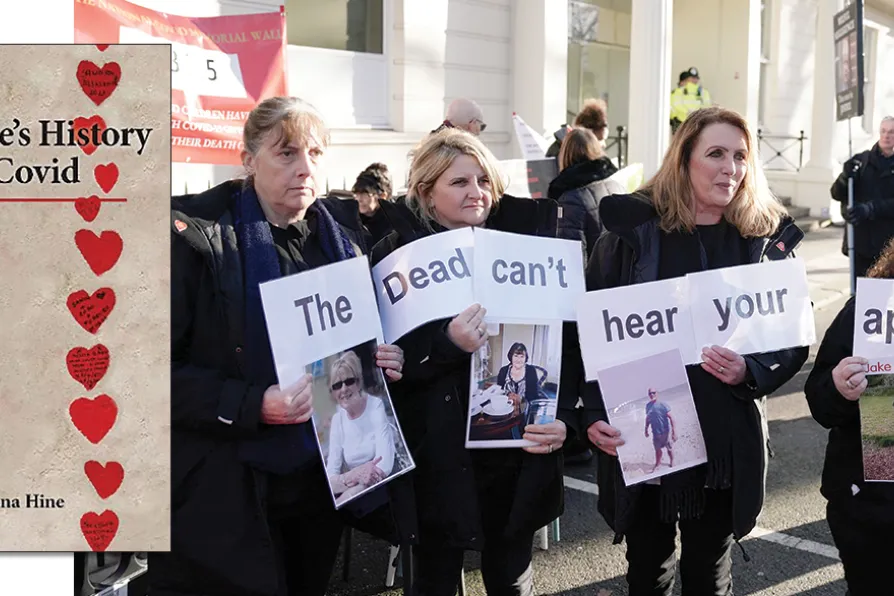JAN WOOLF finds out where she came from and where she’s going amid Pete Townsend’s tribute to 1970s youth culture

 INCONVENIENT TRUTH: (left to right) Kirsten Hackman, Michelle Rumball, Fran Hall and Kathryn Butcher, who were removed from the UK Covid-19 Inquiry as Boris Johnson began his evidence with an apology to victims of the pandemic at Dorland House in London, during its second investigation into core UK decision-making and political governance on December 6 2023
INCONVENIENT TRUTH: (left to right) Kirsten Hackman, Michelle Rumball, Fran Hall and Kathryn Butcher, who were removed from the UK Covid-19 Inquiry as Boris Johnson began his evidence with an apology to victims of the pandemic at Dorland House in London, during its second investigation into core UK decision-making and political governance on December 6 2023
A People’s History of Covid
Terina Hine
Counterfire, £7.50
SHORT, concise, and well written, A People’s History of Covid covers issues thrown up by the global pandemic right through to the present day, and the fact that it comes from a Marxist perspective makes it all the more welcome.
Most regular readers of the Morning Star will be familiar with nearly all the details contained therein but that does not necessarily take away from its significance as a text to be more widely distributed. The important thing about facts is that they need to be repeated time and time again until justice is done and wider social change brought about.
And as regards the British state’s response to Covid, figureheads who often want us to move away from charges of criminality are not only those who remain callously indifferent to their “mistakes“ but also the ones who actually profited from them.
Hine makes more than abundantly clear that it was Boris Johnson and the Tory Party who refused to take any countermeasures until it was too late, who failed to fund an already struggling NHS, who shared out lucrative contracts to themselves and their equally uninformed and unqualified mates, and who had illegal parties while everyone suffered under ineffective, ever-changing and often barely understandable lockdown enforcement policies.
This resulted in international notoriety for Britain due to having some of the highest mortality rates in the industrialised world, death sentences for those infected elderly patients forcibly removed from hospital to care homes, emergency workers donning bin bags rather than PPE, and more money wasted on ludicrous track and trace schemes than was ever spent on the actual vaccines themselves.
Hine makes the often-missed point that given all the above it wasn’t so much the emergence of anti-vaccination and conspiratorial organisations that was a shock, but rather that these dangerous tendencies never developed into a mass movement as most of the general public treated them with both ridicule and contempt.
While the pandemic all too often exposed what is wrong with society, it also demonstrated what is very much right. The contribution of countless workers, and not just emergency workers, who made sure that society continued to function in terms of, for example, healthcare, public transport and keeping supermarket shelves stocked was quite rightly celebrated then and since.
Countless neighbourhood and community initiatives sprung up celebrating mutual aid and voluntary co-operation on a non-profit basis.
Many thousands re-evaluated the importance of friends, family and community, and of spending time in what was then an increasingly greener and cleaner environment, rather than mindless consumerism.
Likewise, social interaction and work roles changed fundamentally through increased use of social media, of Zoom and by those who realised that they could just as easily work from home as anywhere else.
I wasn’t really convinced that the book deserves to be called a “written-from-below people’s history,” although some excellent primary sources are referenced.
My biggest gripe is that nowhere in the text is there any exploration of those countries whose response to the epidemic was immeasurably better.
Socialist governments as varied as Cuba, China and Kerala were all united in implementing timely, well-resourced and proactive measures that bodies such as the World Health Organisation now recognise saved millions of lives.
Is this an unfortunate omission, or a reflection of the authors own ideological prejudices?
Keir Starmer’s tame opposition in term of standing by Johnson at a time of national crisis was as predictable as it was woeful, and while multiple post-pandemic industrial struggles were widely supported and had some success, there have been no overwhelming victories to date. Sadly, it’s been very much a case of back to business as usual.
Let us hope that in the ongoing information war against this that Hines initial, and generally excellent, attack is the first of many.

STEVEN ANDREW is moved beyond words by a historical account of mining in Britain made from the words of the miners themselves













